Desk of Contents:
- Introduction to Synthetic Intelligence
- Core Ideas of Synthetic Intelligence
- Examples of Synthetic Intelligence
- Purposes of Synthetic Intelligence
- Synthetic Intelligence Jobs and Profession Alternatives
- Advantages of Synthetic Intelligence
- Synthetic Intelligence Sources
- Conclusion and Way forward for Synthetic Intelligence
Artificial intelligence is now not a fad, it’s shaping how we understand life, deal with our work, and work together with the world round us. On this weblog, we’ll discover the fascinating journey of synthetic intelligence, its origin, core ideas, real-world functions, and future implications.
1. Introduction to Synthetic intelligence:
AI primarily entails the creation of assorted sorts of machines and algorithms that may carry out duties that require human intelligence. These duties embrace problem-solving, notion and decision-making, understanding language, sample recognition, and plenty of extra.
At its core, AI goals to simulate human thought processes enabling studying experiences and performing the identical job by way of new enter. Such machines are able to receiving very big information by way of machine studying with pure language processing (NLP) and laptop imaginative and prescient.
The affect of AI is profound, spanning industries corresponding to healthcare, finance, training, and leisure. Algorithms handle what’s fed to social media feeds and self-driving autos pave the way in which for clever private assistants, corresponding to Siri and Alexa to construct a brand new future path in how we reside, work, and play.
Historical past and Evolution of AI:
Image Courtesy: analyticsjobs.in
The journey of AI started lengthy earlier than it grew to become a family time period, rooted in philosophical questions in regards to the nature of intelligence and the potential of machines. Right here’s a short have a look at its evolution:
Fifties: The Delivery of AI
Alan Turing’s important query “Can machines assume?” gave added impetus to the concept of AI. His Turing Check grew to become a measure for judging the flexibility of a machine to simulate clever conduct. The Dartmouth Convention of 1956 marked the start of AI as an space of research, the place scientists explored symbolic reasoning and problem-solving.
Nineteen Sixties–Seventies: Early AI Packages
Early AI packages had been restricted to enjoying chess or fixing algebraic issues. These packages proved gradual because of a scarcity of computational energy and information.
Nineteen Eighties: The AI Growth
With the appearance of skilled methods, AI gathered momentum. These methods labored as a simulated human exercise in particular fields, corresponding to medication and engineering. This time additionally witnessed the emergence of neural networks, defining the fashionable situation of AI.
Nineteen Nineties–2000s: Sensible Purposes:
AI moved from concept to real-world functions. Among the eye-catching occasion milestones included IBM’s Deep Blue defeat of chess champion Garry Kasparov in 1997 and the clever search algorithms on which Google and different platforms base their teachings.
The 2010s: The Period of Machine Studying
The explosion of information, mixed with developments in computing energy and algorithms, introduced AI to new heights. It led to machine studying and deep studying changing into the centerpiece of AI analysis, providing beneficial properties in picture recognition, pure language understanding, and autonomous methods.
2020s: The Rise of Generative AI
Generative AI corresponding to GPT (Generative Pre-trained Transformer) and DALL·E has made a novel discovery of recent strategies of creativity and problem-solving. AI has now turn out to be a part of each business, starting from healthcare options to leisure ones, with footprints throughout innovation that promise to vary the long run.
2. Core Ideas of Synthetic Intelligence:
Let’s discover the core ideas of AI:
What’s AI?

Image Courtesy: hostadvice.com
Artificial Intelligence is a discipline of laptop science that offers with the simulation of human intelligence processes by machines. This contains the flexibility to study, acknowledge speech, string sentences into an comprehensible pure language, clear up issues, and generally create one thing new.
AI seeks all strategies tries to mimic in addition to improve human cognitive capabilities on the phantasm of independence within the area of particular conditions. AI-powered methods can study from information, enhance over time, and adapt to altering circumstances, mimicking human-like skills to a outstanding diploma.
Key Elements and Applied sciences:
AI operates by way of a mix of refined elements and cutting-edge applied sciences. Let’s break down the core components that energy AI methods:
A. Machine Studying (ML):
Machine studying manages to study most with out the system having to program them explicitly. Along with this, ML fashions depend on algorithms to find patterns and make choices on the premise of offered information.
B. Pure Language Processing (NLP):
Allow machines to acknowledge, interpret, and generate any language spoken by a human. All these may very well be functions for chatbots and language translation instruments, even voice assistants like Alexa and Siri.
C. Pc Imaginative and prescient:
Empower machines to grasp and analyze visible information, that means to categorize house, photographs, and movies. It has makes use of in recognition functions, corresponding to facial recognition, constructing autonomous autos, and learning photographs in medication.
D. Neural Networks:
Computational methods imitate the construction of the human mind. Neural networks primarily fall underneath the class of deep studying, part of machine studying in a position to deal utterly with unstructured information like textual content, photographs, and audio.
E. Robotics:
AI and mechanical methods harmoniously mix to make sure that robots are clever sufficient to do issues on their very own corresponding to warehouse automation have robotic surgical procedure.
F. Professional Methods:
Professional methods are AI-based laptop packages developed to simulate the choice processes of specialists specifically fields on the premise of a information base and inference guidelines.
Machine Studying vs. Synthetic Intelligence

Image Courtesy: readitquik.com
The phrases “Machine Studying” and “Synthetic Intelligence” are sometimes used interchangeably, however they’ve distinct meanings:
| Facet | Synthetic Intelligence (AI) | Machine Studying (ML) |
| Definition | AI is the broader discipline centered on creating machines that simulate human intelligence. | ML is a subset of AI that permits machines to study from information and enhance over time. |
| Scope | Encompasses varied strategies, together with ML, rule-based methods, robotics, NLP, and laptop imaginative and prescient. | Particularly focuses on algorithms and statistical fashions to investigate information and make predictions. |
| Aim | To develop clever methods able to performing duties like problem-solving, reasoning, and adapting. | To create methods that study from information to carry out particular duties with minimal human intervention. |
| Performance | Can embrace methods that don’t study however act primarily based on predefined guidelines or logic. | Fully data-driven; fashions enhance by figuring out patterns within the information offered. |
| Strategy | Makes use of various approaches, corresponding to symbolic reasoning, choice timber, neural networks, and deep studying. | Primarily makes use of algorithms like regression, classification, clustering, and deep studying. |
| Dependency on Knowledge | Knowledge is essential however not all the time required for rule-based AI methods. | Depends closely on giant datasets for coaching and testing. |
| Flexibility | Can perform with predefined directions or adapt utilizing ML and different strategies. | Requires adaptability and steady studying from new information. |
| Studying Functionality | Consists of each studying and non-learning methods (e.g., skilled methods, robotics). | Completely focuses on methods that study and enhance over time. |
| Key Applied sciences | NLP, laptop imaginative and prescient, robotics, skilled methods, and ML. | Algorithms like choice timber, help vector machines (SVM), neural networks, and clustering. |
| Examples | AI assistants (Siri, Alexa), autonomous autos, chess-playing robots, facial recognition. | Product suggestions, fraud detection, spam filtering, medical diagnoses. |
| Human Interplay | Can vary from excessive automation (autonomous automobiles) to interactive methods (chatbots). | Sometimes operates within the background with minimal direct interplay (e.g., suggestion methods). |
| Complexity | Broader, integrating a number of disciplines and applied sciences. | Narrower, specializing in coaching and bettering fashions. |
| Purposes | Numerous functions throughout industries like healthcare, finance, gaming, and manufacturing. | Particular use instances like buyer segmentation, predictive analytics, and customized experiences. |
| Future Potential | Goals to create generalized intelligence or methods able to broader decision-making. | Advances the sector of AI by bettering the effectivity and accuracy of particular duties. |
AI has turn out to be an integral a part of our lives, influencing how we work, work together, and clear up issues. From simplifying on a regular basis duties to driving innovation throughout industries, its functions are various and impactful. Right here’s a glance of examples of AI.
Synthetic Intelligence in On a regular basis Life:

Image Courtesy: claysys.com
AI-powered options are all over the place, typically making our lives simpler in methods we could not even discover:
A. Voice Assistants: Digital assistants corresponding to Siri, Alexa, and Google Assistant make use of pure language processing (NLP) to listen to instructions, then course of them, and eventually reply.
B. Suggestion Methods: Netflix, Spotify, and Amazon use AI to investigate your preferences and derive customized content material and merchandise.
C. Navigation and Ridesharing: Actual-time site visitors updates, route optimization, and dynamic pricing rely on AI with functions like Google Maps and Uber.
D. Good House Gadgets: Good Thermostats, corresponding to Nest, and safety cameras that make use of AI for automation and face recognition.
E. Social Media Algorithms: Social media feeds, connection ideas, and content material moderation on Instagram, TikTok, and different platforms depend on AI algorithms.
The Newest Innovations In AI:
AI is an evolving discipline of expertise, witnessing developments that stretch far past present capabilities:
A. Generative AI Fashions: ChatGPT, DALL·E, and so on. create photographs, artwork, and eventually human-sounding textual content, therefore revolutionizing content material creation.
B. Autonomous Automobiles: AI principally gives self-driving expertise to Tesla and Waymo, adopting laptop imaginative and prescient, sensor fusion, and decision-making algorithms.
C. AI in House Exploration: Mission planning, robotic exploration, and evaluation of an infinite quantity of information from house telescopes with AI nets are researched by NASA.
D. Healthcare Developments: AI is getting used to develop customized medication, predict affected person outcomes, and help in complicated surgical procedures utilizing robotic methods.
E. Agricultural Expertise: AI-powered drones and sensors assist farmers monitor crop well being, optimize irrigation, and predict harvest yields.
Purposes of AI:
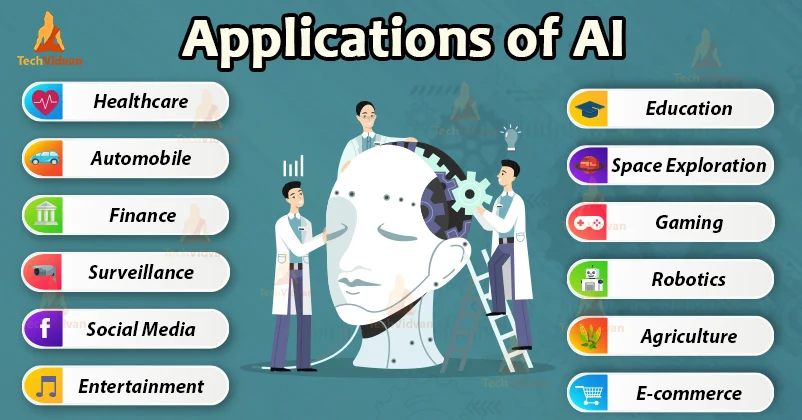
Image Courtesy: techvidvan.com
Listed here are some applications of AI:
A. AI in Healthcare: IBM Watson
IBM Watson modified the face of oncology with its evaluation of monumental quantities of medical information to supply customized therapy choices for most cancers sufferers and save medical doctors’ hours whereas bettering end result outcomes for sufferers.
B. AI in Retail: Amazon Go
Amazon Go shops use AI-powered cameras and sensors to allow cashier-less buying. Clients merely decide up objects, and their accounts are mechanically charged, making a seamless buying expertise.
C. AI in Finance: JP Morgan Chase
JP Morgan makes use of AI to investigate monetary contracts, lowering hours of handbook labor to mere seconds. AI additionally aids in fraud detection and threat administration.
D. AI in Leisure: DeepMind’s AlphaGo
DeepMind’s AI system, AlphaGo, defeated the world champion within the historic recreation of Go. This marked a serious milestone in AI, demonstrating its potential to resolve extremely complicated issues.
E. AI in Surroundings: Google AI’s Flood Prediction
Google AI predicts devastating occurrences with accuracy in order that communities may be enabled in the direction of preparation and doable lack of lives.
Synthetic Intelligence is revolutionizing industries by offering revolutionary options that improve effectivity, decision-making, and buyer experiences. Let’s discover applications of AI and its affect in key sectors:
A. AI in Healthcare:

Image Courtesy: yourstory.com
AI in Healthcare is remodeling healthcare by enabling sooner diagnoses, customized therapies, and improved affected person outcomes:
Medical Imaging and Diagnostics: AI instruments corresponding to DeepMind’s healthcare algorithms scrape and discover matching codes for digital illness occasions like most cancers or diabetic retinopathy in sufferers’ manifests or signs.
Customized Drugs: AI helps analyze genetic make-up, medical historical past, and way of life components, and crafts customized therapy plans.
Digital Well being Assistants: Chatbots and digital assistants like Babylon Well being provide sufferers 24×7 on-call answering and primary-level prognosis.
Drug Discovery: Drug growth by AI, has the flexibility to comb by way of, analyze, and interpret huge databases, thus saving time and prices.
Robotic Surgical procedure: The da Vinci Surgical System employs AI to hold out minimally invasive and really exact surgical procedures, resulting in sooner restoration intervals.
B. AI in Finance:

Image Courtesy: thefinancialpandora.com
The financial sector has embraced AI to boost safety, enhance buyer experiences, and streamline operations:
Fraud Detection: AI methods repeatedly watch transaction patterns to determine and stop fraud in actual time.
Algorithmic Buying and selling: The AI buying and selling algorithm depends on a buying and selling sign that factors to an optimum time to commerce, thus maximizing earnings by analyzing historic and real-time market information.
Customized Banking: Supplies account insights, reminders for payments, and recommendations on bills and spending by chatbot, like Erica from Financial institution of America.
Danger Administration: Market dangers and monetary crises may very well be predicted utilizing AI by learning information traits and anomalies given to those monetary establishments to proactively make choices.
Credit score Scoring: AI enhances the accuracy of credit score threat assessments, guaranteeing honest and environment friendly lending and borrowing processes.
C. AI in Education:

Image Courtesy: orangemantra.com
AI is revolutionizing education by making studying extra accessible, customized, and fascinating:
Tailored Studying: Platforms corresponding to DreamBox and Coursera have classes the place paces and kinds are tailored in order that learners have completely different experiences in training.
Digital Tutors: AI-driven instruments like Squirrel AI can help college students immediately, giving them explanations and extra assets for higher understanding.
Automated Grading: Grading platforms corresponding to Gradescope utilizing AI assist academics by mechanically grading scholar work, giving them further time to show.
Language Studying: Apps like Duolingo deploy synthetic intelligence in customizing modules, real-time suggestions, and selling interactive studying.
Training Accessibility: AI instruments for speech-to-text and visible aids allow college students with disabilities to take pleasure in the identical alternative to study as their able-bodied friends.
D. AI in Retail:

Image Courtesy: goodworklabs.com
AI is enhancing buyer experiences and optimizing operations within the retail sector:
Customized Buying Experiences: AI analyzes buyer information and recommends merchandise in accordance with the desire of the customer corresponding to Amazon and Sephora.
Stock Administration: AI predicts demand traits, serving to retailers handle stock ranges and scale back wastage.
Buyer Service Chatbots: AI reviewers give prompt suggestions, resolve inquiries, and additional help shoppers in shopping for items through growing inner methods.
Visible Search: AI instruments like Pinterest Lens enable customers to seek for merchandise utilizing photographs as a substitute of textual content, making buying extra intuitive.
Dynamic Pricing: AI adjusts costs in accordance with demand, competitors, and shopper conduct.
5. Synthetic Intelligence Jobs and Profession Alternatives:
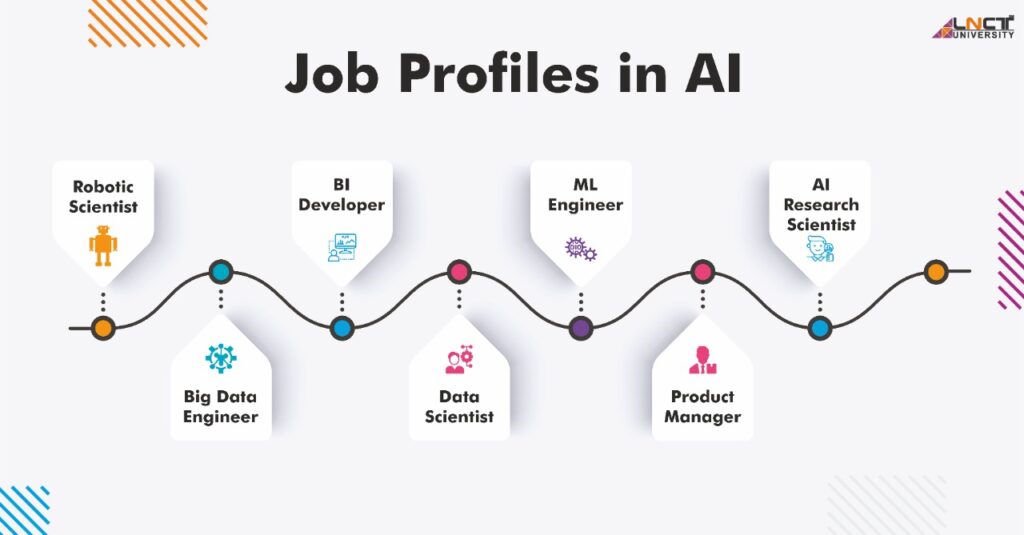
Image Courtesy: lnctu.ac.in
The rise of Synthetic Intelligence has created a booming job market with alternatives throughout industries. From analysis and growth to sensible implementations, AI professionals are in excessive demand. Let’s delve into the important thing features of pursuing a career in AI.
A. Types of AI Jobs:
AI provides various roles catering to completely different expertise and pursuits:
Machine Studying Engineer: Designs and builds machine studying fashions, requiring expertise in Python, TensorFlow, and statistical evaluation.
Knowledge Scientist: Analyzes giant datasets to derive insights and develop predictive fashions, utilizing instruments like SQL, R, and Tableau.
AI Analysis Scientist: Conducts superior analysis to create revolutionary AI options, counting on deep studying and programming experience.
NLP Engineer: Focuses on pure language processing to create chatbots and textual content evaluation instruments, leveraging libraries like spaCy and NLTK.
Robotics Engineer: Develops AI-driven robots for varied industries, requiring information in embedded methods and mechanical engineering.
AI Ethicist: Ensures accountable AI utilization by addressing moral issues corresponding to bias and privateness.
Pc Imaginative and prescient Specialist: Works on enabling machines to course of and interpret visible information, using picture processing and convolutional neural networks.
B. Expertise Required for AI Careers:
Success in AI calls for a mixture of technical experience, analytical considering, and domain-specific information:
Programming Proficiency: Robust expertise in Python, Java, C++, and R as a result of they assist to develop algorithms and software program fashions for synthetic intelligence.
Arithmetic and Statistics: Familiarity with linear algebra and calculus, in addition to some features of chance concept, could help within the development of an AI mannequin.
Machine Studying Algorithms: Experience in supervised, unsupervised, and reinforcement studying strategies.
Huge Knowledge Dealing with: Familiarity with instruments like Hadoop and Spark for processing large-scale datasets.
Cloud Computing: Experience with platforms like AWS, Google Cloud, and Azure for deploying AI solutions.
Communication Skills: Good in explaining AI processes in simple terms to non-technical stakeholders.
Continuous Learning: Look up the latest AI developments, frameworks, and ethical practices.
C. How to Start a Career in AI:
Breaking into the AI field requires strategic planning and consistent effort. Here’s a step-by-step guide:
Build a Strong Foundation: Pursue a degree in computer science, data science, or a related field and take specialized AI courses.
Work on Projects: Gain practical experience by creating predictive models, chatbots, or image recognition systems.
Learn AI Tools and Frameworks: Master tools like TensorFlow, Keras, Scikit-learn, and PyTorch.
Join Online Communities: Network with AI professionals through GitHub, Reddit, and LinkedIn groups.
Seek Internships: Apply for AI-focused internships to gain hands-on industry experience.
Build a Portfolio: Showcase your AI projects on platforms like GitHub or personal websites.
Pursue Advanced Education: Consider a master’s degree or certifications like Google AI Certification or IBM AI Engineering Professional Certificate.
Stay Updated: Follow AI news, attend webinars, and engage with the AI community to keep up with trends.
6. Investing in Artificial Intelligence:
Artificial Intelligence is not only transforming industries but also offering lucrative opportunities for investors. Here’s a closer look at how to navigate AI investments effectively.
AI Stocks: The Overview

Picture Courtesy: fool.com
AI stocks refer to shares of companies that either directly develop or utilize artificial intelligence technologies. These companies could be manufacturers of AI hardware, like advanced processors and chips, or they could be software companies that build AI algorithms and platforms. Companies like Nvidia, Alphabet (Google), and Microsoft as leaders in this space, develop generic capabilities that hundreds of thousands of others can use. Firmly established players include companies such as C3.ai that focus all their efforts on AI applications.
In addition, an investor could explore ETFs dedicated to artificial intelligence. These funds could thereby give exposure to diverse companies in the industry while limiting the risk and aiming for great revenue from various applications of artificial intelligence.
An investment in AI stocks is a long-term bet as, given the fact that businesses will quickly adopt AI and automated solutions, the demand for AI technologies will also rise rapidly.
Understanding Artificial Intelligence Stock:
Artificial intelligence stocks can be categorized into two primary groups: pure-play AI companies and diversified tech giants that integrate AI into their operations.
- Pure-play companies are those whose business model is entirely based on artificial intelligence technology. C3.ai, which is entirely concerned with AI software for the enterprise sectors across many industries, is one such company.
- Diversified tech giants like Amazon, Apple, or IBM would not be focused as AI companies. They have considerable interest in artificial intelligence research and development.
The key considerations for an investor looking at AI stocks include the growth in revenue from AI for specific companies, investment in research and development, and competitive positioning in the AI market. The success of AI companies is often tied to their ability to innovate, keep up with technological advancements, and capitalize on the growing demand for AI applications.
AI Penny Stocks: Risks and Rewards

AI penny stocks are shares of smaller companies in the AI sector, typically trading for less than $5 per share. These stocks can be an attractive option for investors seeking high-risk, high-reward opportunities, as smaller companies in emerging sectors often have the potential for rapid growth. However, investing in AI penny stocks comes with significant risks.
- Rewards: The appeal of AI penny stocks lies in their potential for explosive growth. Early-stage companies that develop innovative AI technologies can see their stock prices rise sharply as their products gain traction in the market. For investors who manage to enter these stocks early, the financial rewards can be substantial.
- Risks: Penny stocks are often highly volatile, with price fluctuations that can be difficult to predict. These companies are typically less stable than their larger counterparts, which can lead to liquidity issues and larger-than-usual swings in stock prices. Additionally, penny stocks are more prone to speculative trading, which can distort the true value of the company. Investors in AI penny stocks must conduct extensive research to evaluate the viability of the company’s AI technologies, market demand, and overall financial health.
Despite the risks, AI penny stocks offer an intriguing opportunity for investors who are willing to take on higher risk in exchange for the chance to invest in promising, early-stage companies. However, careful research and diversification strategies are essential to mitigate the risks associated with penny stocks.
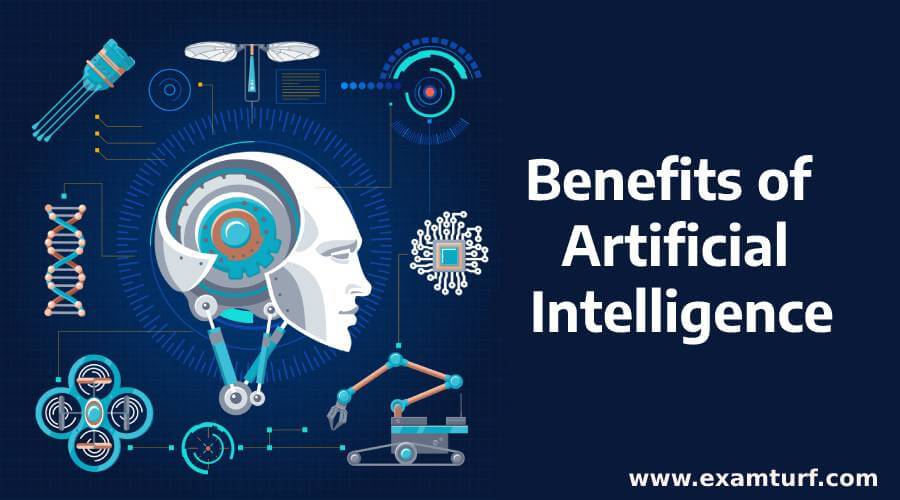
Picture Courtesy: nbkomputer.com
Artificial Intelligence (AI) has transformed the way we interact with technology, enabling machines to mimic human intelligence and perform tasks with remarkable precision. From streamlining processes to enhancing user experiences, AI’s applications are vast and impactful. Its ability to process large volumes of data, learn from patterns, and adapt to new inputs makes it a powerful tool for solving complex problems across various industries. Here are some of the key benefits of AI:
A. Efficiency and Automation:
On the one hand, AI automation saves businesses worldwide time and money. Repeated and mundane tasks can be automated by machine learning algorithms or robotics. AI systems manage workflow, inventory, and supply chains without human touch. Consequently, they become more productive while maintaining the highly strategic roles of human workers.
B. Enhanced Decision Making:
AI analyzes data on a greater scale and faster speed than ever before and produces actionable information for decision-making. Through processing historical and real-time data, these tools can forecast trends, identify risks, and provide recommendations aligned with business needs. This results in informed decisions, reducing the probability of errors.
C. Personalization and Customer Experience:
AI customizes interactions with customers as well as anticipates their demands. Whether through product recommendations appearing on an e-commerce website or 24/7 support provided through AI-enabled chatbots, organizations use technology to present personalized experiences to customers. It finally creates trust, loyalty, and a competitive edge in the market.
8. Artificial Intelligence Resources:
Whether you’re a beginner eager to dive into AI or a professional looking to enhance your expertise, a wealth of resources is available to help you. From books to online courses, staying updated on AI developments is essential for mastering this transformative field. Here’s a breakdown of some key AI resources:
A. Books: Artificial Intelligence: A Modern Approach
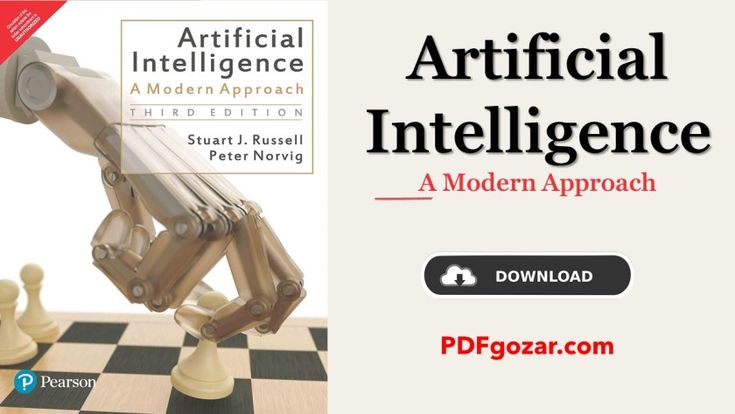
Picture Courtesy: in.pinterest.com
Artificial Intelligence: A Modern Approach is written by Stuart Russell and Peter Norvig, gives a definitive guideline to the principles and application of AI. This massive text covers every theoretical material of AI from search algorithms to what it relates with, machine learning, robotics to what it can do, and natural language processing. However, again it remains a genuine material for beginners and professionals alike in understanding both theoretical and practical aspects of AI.
B. AI News and Updates:
It is really important to keep up with the latest trends and innovations in AI. Sites like AI News, MIT Technology Review, and OpenAI Blog are good resources for keeping up with AI advancements, breakthroughs in research, and industry applications. Signing up for newsletters or following these AI influencers on sites like LinkedIn and Twitter can also keep you updated.
C. Online Courses and Certifications:
Several online platforms offer AI courses for all skill levels:
- Coursera: Offers courses like “Machine Learning” by Andrew Ng, a great starting point for beginners.
- edX: Features programs such as “AI for Everyone” and advanced courses like “Artificial Intelligence MicroMasters.”
- Udemy: Provides a wide range of AI courses, from beginner-friendly to advanced deep learning tutorials.
- Google AI and TensorFlow: Free resources and courses for understanding machine learning and building AI applications.
Completing these certifications can boost your understanding of AI concepts and enhance your career prospects in the field.
9. Conclusion and Future of Artificial Intelligence:
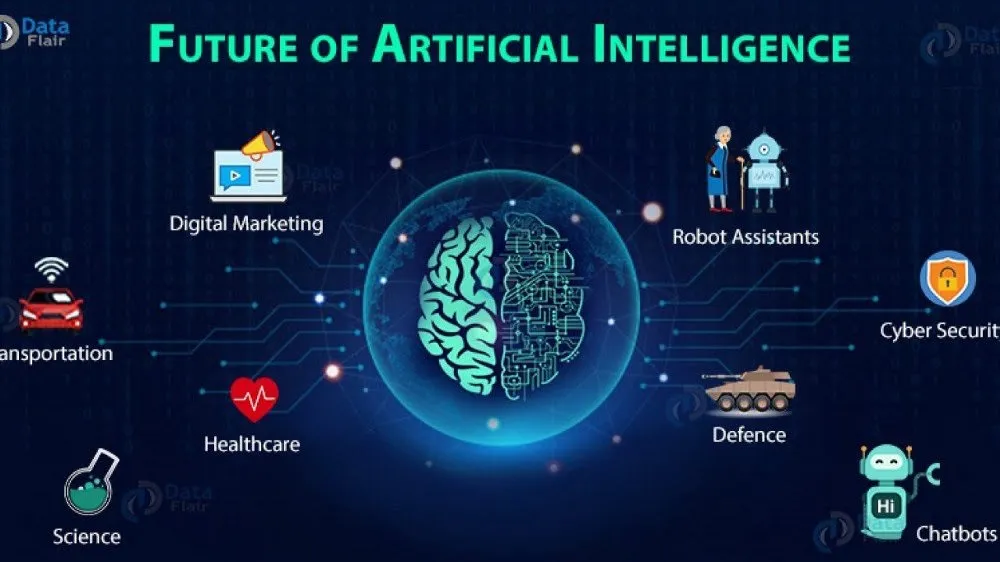
Picture Courtesy: aiecommerce.com
Artificial Intelligence (AI) is no longer just a futuristic concept—it’s a transformative force shaping industries, economies, and daily life. From improving efficiency and decision-making to revolutionizing customer experiences, AI has proven its value across diverse domains. As AI continues to evolve, it will unlock new possibilities, addressing challenges in healthcare, education, transportation, and beyond. However, with its potential comes the need for ethical considerations, transparency, and robust frameworks to guide its development and implementation.
Future of AI: What Lies Ahead?
Let’s see what lies ahead in the future of AI:
A. Enhanced Human-AI Collaboration:
The future will see AI acting as a complementary partner to humans, amplifying our capabilities rather than replacing us. From AI-powered tools that assist in creative processes to robotic systems that support physically demanding tasks, collaboration will redefine work and productivity.
B. AI in Healthcare:
AI is set to revolutionize healthcare through personalized medicine, predictive analytics, and advanced diagnostics. Technologies like AI-driven drug discovery and robotic surgery will become more widespread, improving patient outcomes and accessibility.
C. Autonomous Systems and Smart Cities:
The rise of autonomous vehicles, drones, and smart infrastructure will redefine urban living. AI will play a pivotal role in reducing traffic congestion, optimizing energy consumption, and ensuring public safety in smart cities worldwide.
D. AI and Education:
Education will be transformed by AI through adaptive learning platforms, personalized curriculums, and virtual tutors. These innovations will make learning more accessible, efficient, and tailored to individual needs, bridging educational gaps globally.
E. Ethical AI and Regulation:
As AI becomes more integrated into society, there will be a stronger focus on developing ethical AI systems. Governments and organizations will work to establish guidelines ensuring fairness, accountability, and transparency in AI applications.
F. Quantum AI:
The integration of AI with quantum computing holds immense potential for solving problems currently beyond the scope of traditional computing. From complex simulations to advancements in cryptography, Quantum AI could lead to groundbreaking discoveries.
G. AI-Driven Sustainability:
AI will be instrumental in tackling global challenges like climate change, resource management, and biodiversity conservation. By analyzing environmental data, AI can help create sustainable solutions, monitor ecosystems, and predict natural disasters.
A World of Possibilities:
The future of AI is as exciting as it is unpredictable. While we continue to innovate and leverage AI’s potential, it’s equally important to address challenges such as data privacy, algorithmic bias, and job displacement. By fostering collaboration between researchers, policymakers, and industry leaders, we can ensure AI is developed responsibly and inclusively. The next frontier of AI will be defined by how effectively we balance its immense potential with its inherent responsibilities, creating a future where technology truly benefits humanity.
AI holds the promise of reshaping our world, making it smarter, more efficient, and interconnected. However, as we embrace its potential, we must also navigate challenges like ethical use, data privacy, and societal impact. The future of AI depends on how responsibly we innovate and integrate it into our lives.
What’s your take on AI? Do you see it as a tool for progress, or do you have concerns about its rapid growth? Share your thoughts in the comments below!
For more insights and updates on Metaverse, DeFi, Blockchain, NFT & Web3, be sure to subscribe to our newsletter. Stay informed on the latest trends and developments in the decentralized world!
You might also like
More from Web3
Ethereum NFT Project Doodles Launches DOOD Solana Token Airdrop
In short Doodles launched its DOOD token Friday on Solana. DOOD might be on the middle of its model shifting ahead, …
T-Rex Grabs $17 Million to Lead a Web3 Cultural Breakthrough with Reward-Driven Engagement
Hong Kong, Could 9, 2025, | by way of Chainwire In a daring transfer that indicators the following evolution in …
IOT Technology Revolutionizing Manufacturing And Transportation Boost The Telecom Market: A Significant Driver Propelling The Telecom Market In 2025
Telecom Market Dimension The Telecom Market Report by The Enterprise Analysis Firm delivers an in depth market evaluation, overlaying …












